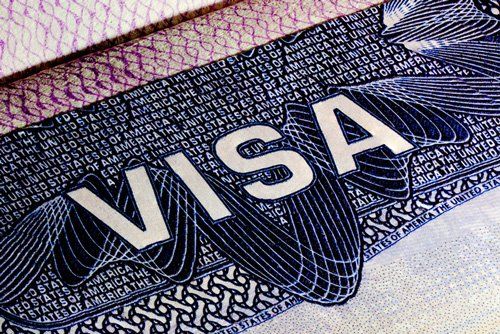Who is Eligible to Apply for Family Based Permanent Resident Status?
- By Admin
- •
- 09 Jul, 2020
- •

Permanent residents and US citizens may file a visa petition to seek permission for certain family members to apply for permanent resident status based on a hierarchical preference system which is explained in each monthly Visa Bulletin issued by the Department of State (DOS) with current priority dates. https://travel.state.gov/content/travel/en/legal/visa-law0/visa-bulletin.html Except for immediate relatives of US citizens (spouses, children under age 21 and parents with US citizen children over age 21), there is a waiting list because the number of visas that can be issued for family members is limited. There is no limit on visa numbers for immediate relatives.
Every permanent resident must be allocated a visa number so the government can keep track of the number of visas used and available. The date the petition is filed with the immigration service is the priority date. There are significant backlogs for visa numbers for most family-based preference categories which means there is often a long wait before the relative is able to apply for permanent resident status. Each month the DOS issues the Visa Bulletin which shows the current priority dates for each preference category. The beneficiary of the visa petition may not apply for an immigrant visa or for adjustment of status to permanent resident until the priority date is at least one day past the relevant priority date. The filing of the visa petition does not give the beneficiary any right to come to, remain in or work in the United States during the wait for the priority date to become current.
US Citizens may apply for
Immediate Relatives:
Spouse or widow(er)
includes spouses of US citizens who have entered
into a
real and legal spousal relationship, which was not entered into for immigration
benefits.
Unmarried children (including some adopted and stepchildren) under the age of 21 of a US citizen. A parent is an immediate relative if the US citizen is 21 years of age or older. There are no annual numerical limits for immediate relatives. This category also covers:
Fiancé(e)s (technically not an immediate relative until marriage to the US citizen takes place, but must meet the same and a few additional requirements, so the application process is similar to an immigrant visa). The fiancée petition may only be filed for people outside the United States. The beneficiary must apply for the visa at a US consulate after the approval of the petition for a fiancée. The US citizen petitioner must prove that the engaged couple have met physically within the past two years, the intent and legal ability to marry within 90 days after the fiancée enters the US on the fiancée visa and that the relationship is bona fide and not solely for immigration benefits.
Battered spouses of US citizens and widow(er)s of US citizens may file their own visa petitions under which they are considered to be immediate relatives not subject to a visa number limitation.
Non-Immediate Relatives
First Preference: Married Sons and Daughters over Age 21
Third Preference: Unmarried Sons and Daughters over Age 21
Fourth Preference: Siblings
Permanent Residents may apply for
Second Preference A: Spouse and unmarried children under age 21
Second Preference B: Unmarried Son or Daughter over the age of 21. (If the beneficiary marries before permanent resident status is granted, the visa petition is voided and may not be reinstated even if the marriage terminates. The priority date is lost. A new petition may be filed upon termination of the marriage or when the permanent resident becomes a US citizen, as US citizens may file for married and unmarried sons and daughters.)
Battered spouses and children of permanent residents may file immigrant visa petitions for themselves and will be in the same preference category they would be in if the permanent resident family member filed for them. Their priority date is the date the special immigrant visa petition is filed.
Derivatives family members of preference categories: The spouse and unmarried children under 21 of any beneficiary in a preference category will be permitted to apply for an immigrant visa at the same time as the beneficiary or within two years they can “follow to join.” Of course, they must be otherwise eligible for permanent resident status. The spouse and unmarried children of an immediate relative may not immigrate as a derivative. Each such relative will have to have a separate visa petition.

Permanent Resident Status, commonly referred to as having a green card, is officially defined as “the status of having been lawfully accorded the privilege of residing permanently in the United States as an immigrant in accordance with the immigration laws, such status not having changed. Such status terminates upon entry of a final administrative order of exclusion or deportation.” The Citizenship and Immigration Services defines a Green Card holder (permanent resident) as someone who has been granted authorization to live and work in the United States on a permanent basis. As proof of that status, a person is granted a permanent resident card, commonly called a "Green Card." The Green Card or Permanent Resident Card is only evidence of status. With the exception of conditional permanent residents (to be discussed below), permanent resident status does not expire with the card. However, a new card must be obtained every ten years until the person becomes a US citizen. Conditional Permanent Residents, such as some entrepreneurs and spouses of US Citizens or Permanent Residents who have been married for less than two years on the date permanent resident status is granted, receive green cards that expire after two years. Before the expiration of the card, the conditional permanent resident must file a petition to remove the conditions on resident status. If approved, conditional permanent residents then become permanent residents and receive ten year green cards.
An immigrant is someone who intends to come to the United States permanently. Anyone who intends to come to the US for a temporary stay is called a nonimmigrant. In order to legally come to the United States and become a permanent resident or to adjust status to permanent resident within the borders of the United States, an immigrant must have immigrant intent and an approved visa petition filed by a qualifying family member, employer, or oneself or be eligible after a period of time in certain humanitarian statuses. The only other way is for Congress to pass a Private Bill for an individual. Permanent resident status is never automatically granted or derived like citizenship can be. Every person who becomes a permanent resident must file an application to adjust status or an application for cancellation of removal in deportation proceedings, if qualified and physically present in the US, or must apply for an immigrant visa at a consulate outside the United States. Only those with approved visa petitions based on certain family relationships, employer petitions, high merit, membership in special groups, and those who are entitled to adjust status after a certain length of time in a humanitarian status such as asylum, refugee, U, T and S visa holders or someone who has been physically present in the US since 1972 or someone granted Cancellation of Removal may apply for permanent resident status. Occasionally Congress passes legislation that permits special groups of people who qualify under special legislation to apply for themselves, such as the Cuban Adjustment Act and NACARA.
An approved visa petition does not give anyone the right to come to the United States or remain in the United States. The visa petition is actually a request for an immigrant visa to be issued to someone on the basis of family relationship, employment relationship, or special or humanitarian categories. The beneficiary of the petition must also qualify for and demonstrate eligibility for permanent resident status and a visa number must be available, since the number of permitted immigrant visas is limited. There are many grounds upon which permanent resident applications may be denied, even for those who are spouses, parents or children of US citizens.
Permanent Residents have the right to:
- Live permanently in the United States, provided they do not commit a deportable offense;
- Work in the United States in any job with a few, mainly national security, exceptions;
- Travel in and out of the US freely, unless deemed inadmissible upon a return to the US; and
- Be protected by all laws of the United States, the state of residence and local jurisdictions.
Permanent Residents have many responsibilities and must actively and consciously maintain permanent intent and status to avoid removal or loss of permanent resident status
Permanent Residents are required to:
- Obey all laws of the United States the states, and localities;
- Properly file all income tax returns, and report all income from anywhere in the world to the US Internal Revenue Service and state taxing authorities;
- Support the democratic form of the US government and not advocate or perform any activity to change the government through illegal means;
- Intend to reside permanently in the US;
- Be physically present in the US for more than half of every year, unless exempted by law;
- Register with the Selective Service if a male aged 18 through 25; and
- File a Change of Address form with Citizenship and Immigration Services within ten days of any move.
Future blogs will discuss in more detail who can apply for permanent resident status, how to maintain permanent resident status and how to lose permanent resident status.




